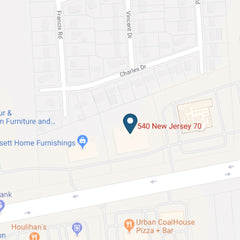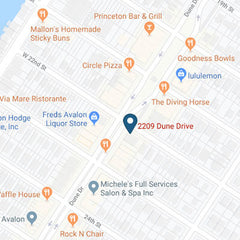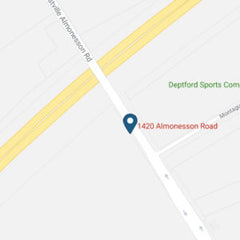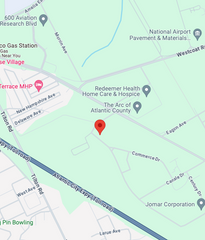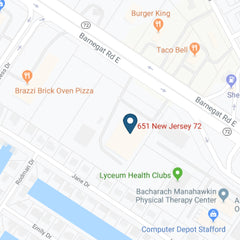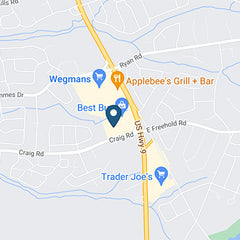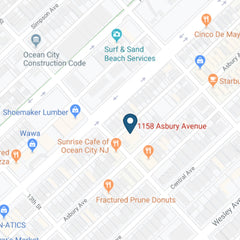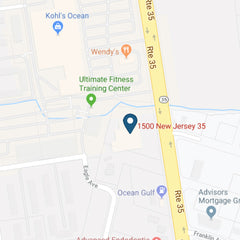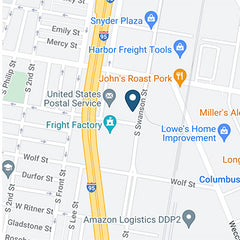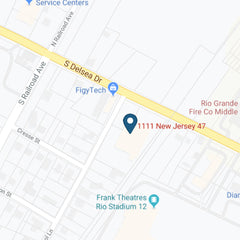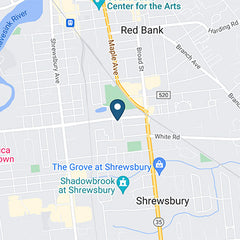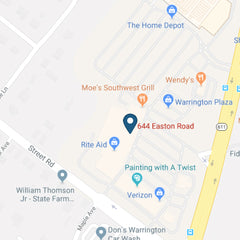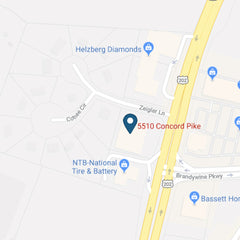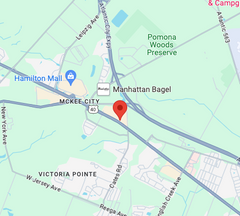As you review your flooring material options, it's important that you have a grasp on how your flooring will affect the look and functionality of your space. There are a few important details to consider, including:
- How is the space being used and are there parts that are considered high-traffic
- The overall style of your space and your building codes
- How you want your flooring to reflect your brand (material, colors, patterns, finishes)
- Americans with Disabilities Act (ADA) compliance
- Load bearing requirements (how much weight/pressure will be put on floors)
Here's our guide to comparing the most common commercial flooring options:
LUXURY VINYL FLOORING
When it comes to resilient vinyl flooring there are a few options to choose from including Sheet Vinyl, Luxury Vinyl Tile (LVT) and Luxury Vinyl Planks (LVP). Sheet Vinyl comes in 6', 9' or 12' wide rolls depending on the manufacturer. Typically this type of flooring is an industry standard for flooring in healthcare facilities where area's need to be sterile such as operating rooms and surgical suites. LVT is a luxury vinyl product that mimics the look of stone or ceramic tile and may even have a surface texture that feels like the real thing. LVP is luxury vinyl flooring that typically looks like wood planks in everything from color to species and with surface textures that include scraping and even embossing, giving it a dramatically heightened realism. Both LVT & LVP can be used in a wide range of applications and commercial environments.
Is Luxury Vinyl Flooring Right For Your Commercial Project?
Sheet Vinyl
-
Pros
Durability & Aesthetics
Due to manufacturing that includes a protective outer wear layer over the digital graphic/image film layer, sheet vinyl is durable and used for unique designs that may require larger sheets without visible seams
-
Cons
Difficult to Replace
The lack of seams makes maintenance sometimes more challenging; if a section of vinyl sheet flooring gets damaged you will have to cut and replace the entire section rather than just a plank or tile
Luxury Vinyl Tile or Planks
-
Pros
-
Design Possibilities
Manufacturers have been pushing the envelope with design and have created an impressive selection of sizes, shapes, and colors for your project as well as enhanced digital graphics that make some of the new designs indistinguishable from their natural inspirations
-
Design Possibilities
-
Cons
-
Higher Initial Cost
Due to the durability and minimal maintenance requirements – there are little to no cons when considering LVT/LVP products for your commercial space – unless you are directly comparing t to another option like Sheet Vinyl where the cost may more upfront initially but often is negated by the fact that overtime it's lifetime costs are minimal
-
Higher Initial Cost
BROADLOOM CARPETING
Broadloom carpet, as the name implies, is woven on a wide (or broad) loom and is a more traditional and widely used floor covering option in commercial spaces. Carpet is a great choice for covering a larger space easily and can be customized to match your brand and décor style. Unlike hard surface flooring options, commercial broadloom carpet is known to help absorb noise and prevent slipping. Unlike carpet used in homes, most commercial broadloom installations are directly glue to the subfloor. The type of backing, traffic patterns and how the space is used will help determine what installation method is appropriate for the space. This may allow the carpet to be installed over a felt pad or require a double stick installation over a rubber pad.
Is Broadloom Carpet Right For Your Commercial Project?
-
Pros
-
Design Possibilities
Broadloom carpet is available in a wide range of colorful patterns and elegant design options, making it easy for you to find a style that fits your needs
-
Acoustics
Commercial broadloom carpet offers superior noise absorption when compared to other flooring options, making it a great choice for office environments
-
Design Possibilities
-
Cons
-
Difficulty to Repair
If an area becomes damaged by moisture or spills, the whole carpet will most likely have to be replaced
-
Can be Wasteful
As mentioned previously, broadloom carpet comes in larger rolls that will be cut to fit the space; sometimes this can generate a surprising amount of waste depending on the layout of the space
-
Difficulty to Repair
MODULAR CARPET TILES
Modular carpet tiles are also known as carpet squares and offer you a modern and stylish alternative to broadloom carpeting for your commercial space. Carpet tiles can be used as an alternative to wall to wall carpeting and can create a warm and welcoming working environment and place for your customers or guests.
Are Modular Carpet Tiles Right For Your Commercial Project?
-
Pros
-
Maintenance
Just like broadloom carpeting, carpet tiles require regular vacuuming with the occasional deep cleaning; however, in a scenario when a portion of the carpet becomes damaged, it easier to spot-replace carpet tiles as opposed to broadloom options
-
Design Possibilities
When installing modular carpet tiles you have the freedom to install them in different configurations to create patterns that are unique as well as have the flexibility to add accent tiles for splashes of color or to create transitions from one space to the next
-
Maintenance
-
Cons
-
Visible Seams
In some cases, depending on the pattern and or design of the modular carpet tile you select, you will be able to see the seams of the tiles and don't always create the unified appearance of a seamless floor
-
Cost
Due to the convenience of pre-cut tiles and an attached/built-in underlay or cushion, carpet tiles may seem to be higher cost than broadloom carpeting at first glance
-
Visible Seams
CERAMIC & PORCELAIN FLOOR TILES
Floor tiles are a great solution for commercial spaces that are looking for a good mix of safety, functionality and attractiveness. Often seen in lobbies and entry ways you can create an impactful first impression due to the wide choice of patterns and colors available for your project. The terms ceramic and porcelain often get thrown around interchangeable, but they're not one and the same. Here are some important differences to keep in mind as you consider your options:
-
How They're Made
Both porcelain and ceramic tiles are similarly manufactured from baking clays, however what really separates them is their density and durability.- Ceramic tiles are more delicate and less porous meaning they can easily absorb water.
- Porcelain tiles are fired at higher temperatures for a longer time than ceramic, which makes them more durable and denser—practically completely water-resistant
-
Appearance
Another factor that sets them apart is their appearance. With today's technology and ever-changing trends, both tiles can be any color or pattern imaginable.
- Porcelain's color or design is carried through its entire body. If they happen to get chipped, it's not as obvious.
- Ceramic tile designs and colors are printed on the surface and protected with a type of glaze. So, if it gets chipped, it'll be more noticeable since the body of the tile is a different color than the surface.
Is Ceramic or Porcelain Tile Right For Your Commercial Space?
Porcelain and ceramic tile are exceedingly durable and offer excellent lasting quality. Both tiles provide a premium, high-end finish and can come in a broad range of colors and textures.
-
Pros
-
Durability
Tile is designed to create a quality appeal but also serve a high volume of foot traffic making it a great choice
-
Waterproofing
Due to its construction, porcelain tile can be used in high traffic and wet areas where other non-waterproof products could be damaged due to moisture
-
Durability
-
Cons
-
Initial Cost
Costs can be a drawback when considering using tile for your commercial space but their durability reduces long-term maintenance costs and ultimately can deliver great long-term value and appeal to your space
-
Initial Cost
Here are a few additional flooring options that tend to have some more limitations that you should be aware of based on the intended use and overall environment:
LAMINATE FLOORING
What is Laminate Flooring?
Laminate flooring is made of four layers of materials that, when fused together, create a durable and beautiful floor:
- Wear Layer – the top, clear layer that aids in the resistance of stains, fading & scratches/dents
- Design Layer– a high-resolution photographic image that showcases the genuine wood look
- Inner Core– high density fiberboard or HDF, which is an engineered wood product that helps keep the laminate board stable, flat and moisture resistant
- Backing– an added layer of moister barrier that protects the floor from warping
Is Laminate Flooring Right For Your Commercial Project?
Today's laminate flooring options can rival the aesthetics of traditional hardwood flooring without the higher cost and stress of complicated maintenance. However, there are many important things to consider in regards to the practical and aesthetic requirements of your space and how this flooring may fit into that.
-
Pros
-
Appearance
Today's manufacturing technology creates laminate flooring that truly rival the aesthetics of traditional hardwood floors giving you a wide range of options to choose from
-
Cost
Laminate is available at a much lower price point than some other options so when renovation budgets are tight it could be a more accessible option
-
Maintenance
Overall laminate flooring is easy to clean and maintain and is almost impervious to dents and scratches thanks to its wear layer
-
Appearance
-
Cons
-
Acoustics
One of the major drawbacks of laminate flooring in commercial spaces is the fact that it has a poor acoustic profile (even compared to other hard surface options)
-
Moisture Concerns
If laminate is exposed to excessive moisture or standing water it can seep into the seams between the boards causing it to swell and/or damaging your subfloor
-
Subfloor Preparation
With laminate flooring, the subfloor is extremely important to the life span and performance of the flooring; being that laminate is a thin, resilient option, it is vulnerable to any problems that originate beneath it (nails, separating floor joists, moisture) so it is imperative that the subfloor is optimal prior to installation
-
Durability
While laminate flooring has a strong wear layer that protects it from dents and scratches, it is important to note that it is not able to be sanded and/or refinished if it becomes heavily worn, deeply scratched, or grooved; ultimately, it will have to be replaced
-
Acoustics
HARDWOOD FLOORING
What is the difference between engineered and solid hardwood flooring?
Unlike conventional hardwood, which comes straight out of a tree, engineered hardwood flooring is a more complex product that consists of several layers. The outermost layer is a hardwood veneer, which is a thin slice of wood (about less than 1/8") of whatever species you prefer. The inner layers are made of plywood, high-density fiberboard or hardwood that are put together in different directions from one another, makes the core of engineered hardwood more stable and resistant to warping or swelling than a solid hardwood plank is.
Is Engineered or Solid Hardwood Flooring Right For Your Commercial Project?
If moisture concerns are present – engineered hardwood may be a great solution for your commercial space, especially if you are trying to achieve introduce an organic and timeless aesthetic. But while wood flooring is a great fit in certain spaces, the rigorous demands of the modern workplace can mean that other flooring options may be more suitable.
In general, both hardwood and engineered hardwood flooring will give you a classic high end look for a price. Both types offer you an upscale design feature and while pricing may vary based on the type of wood and finish or plank size you select, it can still be a larger investment than you were originally planning on. Also both products require attention and regular maintenance to keep up its "wow" factor.
Here are a few other factors to consider when choosing between engineered or solid hardwood flooring:
Engineered Hardwood Flooring
-
Pros
-
Moisture Resistance
Engineered Hardwood doesn't expand or contract as much as other flooring options when it comes in contact with moisture, meaning it is less likely to warp, crack or buckle
-
Moisture Resistance
-
Cons
-
Easily Damaged
The wood layer of engineered hardwood can be easily damaged so moving furniture, dropping heavy items and even walking in high heels can lead to the surface being scratched, scuffed or indented
-
Easily Damaged
Solid Hardwood
-
Pros
-
Aesthetics
Solid hardwood flooring is a high-end product and can bring a sense of prestige to your commercial space; this makes it a popular choice for entrances and lobbies to create a great first impression
-
Aesthetics
-
Cons
-
Difficult to Replace
Some installations involve gluing the plank to the subfloor ensuring that it stays firmly in place; this makes it difficult to replace areas of worn wood without replacing the entire floor
-
Difficult to Replace
With so many types of commercial flooring to choose from, it's essential that you understand the priorities of your organization and ultimately how the space will be being used in order to make the best choice. By solely focusing on the design of the space and forgetting to consider how your design choices will impact the use will impact the overall experience of the people using the space.
Also, it is important to work with a project partner who can help you navigate these options and make recommendations based on experience with organizations and work spaces similar to yours like Avalon Flooring. With design and professional installation services available as well as a commercial installation warranty, we want to be your project partner and help you bring your commercial space to life and be one that you can be proud of for years to come.
At Avalon Flooring, we want to make sure you're happy from your first step in our showroom to your first step on your new flooring—and as your partner in home design, we'll be there every step along the way. Consider us your "One-Stop Shopping" destination for all things flooring…(and window treatments)!
Our design consultants are equipped with the knowledge to guide you through the wide selection of products we offer, and our expert installation team is professionally trained to make sure everything gets installed the way you envision. We know your home is an expression of your sense of style, and we're here to make sure you'll be proud of it for years to come.


